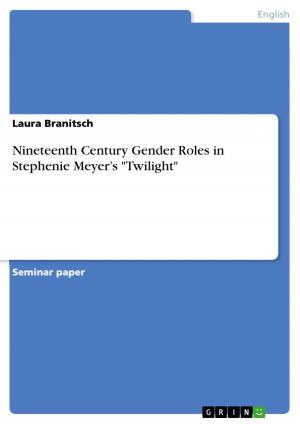Feminism of Woman Teachers in the First Half of the 20th Century
Nonfiction, Reference & Language, Study Aids, ESL, Foreign Languages| Author: | Iw Marinkovic, Hannes Alter | ISBN: | 9783638234993 |
| Publisher: | GRIN Publishing | Publication: | December 4, 2003 |
| Imprint: | GRIN Publishing | Language: | English |
| Author: | Iw Marinkovic, Hannes Alter |
| ISBN: | 9783638234993 |
| Publisher: | GRIN Publishing |
| Publication: | December 4, 2003 |
| Imprint: | GRIN Publishing |
| Language: | English |
Seminar paper from the year 2000 in the subject English Language and Literature Studies - Culture and Applied Geography, grade: 2 (B), University of Kassel (Anglistics), course: New Feminism, 27 entries in the bibliography, language: English, abstract: From the mid-19th century up to the outbreak of the war in August 1914 the suffrage campaign had attained the size and the status of a mass movement, riveting the attention of the British public. During the wartimes the activities of suffragists came to a halt, and a new, 'domestic ideology' emerged. When in early 1918 the Parliament granted the vote for women over the age of thirty, as a gesture of recognition for women's contribution to the war effort, British feminists felt the neccessity to fight for a deeper, a more essential reformation in society. New feminist organizations were created, laws improving the status of mothers were passed and a passionate debate over the nature of feminism had begun. 'But by 1930 feminism seemed much less a threat to traditional structures' than during the wartimes and the postwar period. How could it be that such a big movement like the suffrage campaign had been so powerful and finally disappeared, considering that 'interwar feminism trapped women in the cult of domesticity from which earlier feminists had tried to free themselves'? Why should a woman choose to enter the teaching profession in the first half of the twentieth century? Teaching offered a large number of attractions as a job for women. Professional teaching involved the notion of a career, a life's work after a specific training, open only to those of a sufficient academic capacity. See: Teaching young children was said to be: '...one of the best forms of reconstruction work. The care of the children brings the teacher into closer touch with their mothers, who often come to her for advice in any and every subject: thus she may be a means of furthering the social betterment of the homes and the country.' (Students' Careers Association, Careers, p.15. Also see Board of Education, Training of Teachers, p.40) Women teachers became confident because of their academic success, their professional aspirations and their teacher education, which gave them a sense that they were part of an elite, especially a part of a female elite. Elementary and secondary school teachers were different in their routes into the teaching profession: Women who taught in elementary schools usually came from the intelligent working class or the lower middle class and underwent their education in a training college while secondary school teachers usually came from middle class and were university educated. [...]
Seminar paper from the year 2000 in the subject English Language and Literature Studies - Culture and Applied Geography, grade: 2 (B), University of Kassel (Anglistics), course: New Feminism, 27 entries in the bibliography, language: English, abstract: From the mid-19th century up to the outbreak of the war in August 1914 the suffrage campaign had attained the size and the status of a mass movement, riveting the attention of the British public. During the wartimes the activities of suffragists came to a halt, and a new, 'domestic ideology' emerged. When in early 1918 the Parliament granted the vote for women over the age of thirty, as a gesture of recognition for women's contribution to the war effort, British feminists felt the neccessity to fight for a deeper, a more essential reformation in society. New feminist organizations were created, laws improving the status of mothers were passed and a passionate debate over the nature of feminism had begun. 'But by 1930 feminism seemed much less a threat to traditional structures' than during the wartimes and the postwar period. How could it be that such a big movement like the suffrage campaign had been so powerful and finally disappeared, considering that 'interwar feminism trapped women in the cult of domesticity from which earlier feminists had tried to free themselves'? Why should a woman choose to enter the teaching profession in the first half of the twentieth century? Teaching offered a large number of attractions as a job for women. Professional teaching involved the notion of a career, a life's work after a specific training, open only to those of a sufficient academic capacity. See: Teaching young children was said to be: '...one of the best forms of reconstruction work. The care of the children brings the teacher into closer touch with their mothers, who often come to her for advice in any and every subject: thus she may be a means of furthering the social betterment of the homes and the country.' (Students' Careers Association, Careers, p.15. Also see Board of Education, Training of Teachers, p.40) Women teachers became confident because of their academic success, their professional aspirations and their teacher education, which gave them a sense that they were part of an elite, especially a part of a female elite. Elementary and secondary school teachers were different in their routes into the teaching profession: Women who taught in elementary schools usually came from the intelligent working class or the lower middle class and underwent their education in a training college while secondary school teachers usually came from middle class and were university educated. [...]















